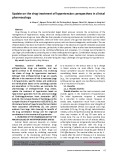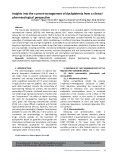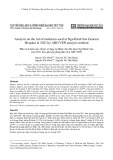
Cardiovascular drugs
-
Drug therapy to achieve the recommended target blood pressure remains the cornerstone of the management of hypertension. Today, there are strong evidences from randomized controlled trials that antihypertensive drugs are more effective than placebo at reducing cardiovascular mortality and morbidity.
 8p
8p  vifaye
vifaye
 20-09-2024
20-09-2024
 3
3
 1
1
 Download
Download
-
The low-density lipoprotein cholesterol (LDL-C) is established as a causative agent of atherosclerotic cardiovascular disease (ASCVD) and lowering plasma LDL-C levels represents the main approach to reduce the risk of cardiovascular events. Statins remain the cornerstone of drug therapy for dyslipidemia.
 11p
11p  vifaye
vifaye
 20-09-2024
20-09-2024
 1
1
 1
1
 Download
Download
-
The study was carried out by retrospective descriptive method with the list of drugs used at the hospital in 2021 including 237 drugs. Results: Class A drugs accounted for 20.25% of the total number of drugs, accounting for 80% of the use value; class B drugs accounted for 21.52% in quantity and 14.94% in use value; class C drugs accounted for 58.23% in quantity and 5.06% in use value. In class A, the class of traditional medicine preparations accounts for 18.75% in quantity and 21.56% in use value.
 9p
9p  nhanchienthien
nhanchienthien
 25-07-2023
25-07-2023
 8
8
 3
3
 Download
Download
-
Tuyển tập các báo cáo nghiên cứu về y học được đăng trên tạp chí y học General Psychiatry cung cấp cho các bạn kiến thức về ngành y đề tài: Disease-modifying antirheumatic drugs are associated with a reduced risk for cardiovascular disease in patients with rheumatoid arthritis: a case control study...
 6p
6p  thulanh13
thulanh13
 14-10-2011
14-10-2011
 58
58
 4
4
 Download
Download
-
Diuretics increase the rate of urine flow and sodium excretion and are used to adjust the volume and/or composition of body fluids in a variety of clinical situations, including hypertension, heart failure, renal failure, nephrotic syndrome, and cirrhosis. The objective of this chapter is to provide the reader with unifying concepts as to how the kidney operates and how diuretics modify renal function. The chapter begins with a description of renal anatomy and physiology, as this information is prerequisite to a discussion of diuretic pharmacology....
 281p
281p  vanass
vanass
 01-04-2011
01-04-2011
 78
78
 11
11
 Download
Download
-
Hypothermia: Treatment When a patient is hypothermic, target organs and the cardiovascular system respond minimally to most medications. Moreover, cumulative doses can cause toxicity during rewarming because of increased binding of drugs to proteins, and impaired metabolism and excretion. As an example, the administration of repeated doses of digoxin or insulin would be ineffective while the patient is hypothermic, and the residual drugs are potentially toxic during rewarming. Achieving a mean arterial pressure of at least 60 mmHg should be an early objective.
 5p
5p  ongxaemnumber1
ongxaemnumber1
 29-11-2010
29-11-2010
 69
69
 5
5
 Download
Download
-
Correction of blood lipid abnormalities offers scope for a major impact on cardiovascular disease. Drugs play a significant role and have a variety of modes of action. Dietary and lifestyle adjustment are components of overall risk prevention.
 8p
8p  bigbaby87
bigbaby87
 03-09-2010
03-09-2010
 79
79
 10
10
 Download
Download
-
Anyone who administers drugs acting on cardiovascular adrenergic mechanisms requires an understanding of how they act in order to use them to the best advantage and with safety. Adrenergic mechanisms Classification of sympathomimetics: by mode of action and selectivity for adrenoceptors Individual sympathomimetics Mucosal decongestants Shock Chronic orthostatic hypotension Adrenaline, noradrenaline and dopamine are formed in the body and are used in therapeutics. The natural synthetic path is: tyrosine — dopa — dopamine — noradrenaline — adrenaline.
 13p
13p  bigbaby87
bigbaby87
 03-09-2010
03-09-2010
 87
87
 10
10
 Download
Download
CHỦ ĐỀ BẠN MUỐN TÌM




















